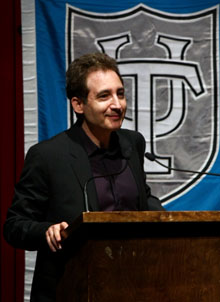Science Crusade
Few people are good at talking about things they can't understand. Brian Greene, however, has made a career of researching and talking about something that even he admits borders on incomprehensible.

Science "is our prime means of molding the future," said Brian Greene, a foremost physicist in the cutting-edge field of superstring theory, speaking at Dixon Hall on Tuesday (March 16). (Photo by Guillermo Cabrera-Rojo)
Greene is one of the foremost physicists in the cutting-edge field of superstring theory, the best-selling author of The Elegant Universe and Fabric of the Cosmos and a popular talk show guest. He visited the Tulane uptown campus on Tuesday (March 16) as the 2010 Newcomb-Tulane College Lecturer.
In his writings over the years and in his lecture Tuesday night Greene readily admits that many aspects of string theory are speculative, including the idea that we live in a world with 10 dimensions. But Greene has developed another theory that is easier to prove.
He believes that the general public's limited scientific knowledge is not due to a lack of interest, but due in part to the way it is taught and communicated. Greene, known for making the incomprehensible comprehensible and fun proved his theory again by drawing a full crowd to Dixon Hall.
Jerry Lakin, a junior planning to pursue a career in physics, also confirmed it, saying, "The first thing that got me interested in physics was reading The Elegant Universe when I was 15."
Often, Greene explained, emphasis in the classroom is placed on memorizing names and numbers, rather than on understanding, and getting excited about, the "big picture."
Comparing teaching science to teaching English, Greene said, "When you're reading novels, it feels relevant" and links to students' daily lives are obvious. However, with science, he said, "We need to make those links obvious. They're there, just a little removed."
For Greene, a working knowledge of science is of paramount importance.
"Science is a way of rationally evaluating the world around you," he said. "It is our prime means of molding the future."
Catherine Freshley received a bachelor of arts in economics and English from Tulane in May 2009.
